|
|
|
Sort Order |
|
|
|
Items / Page
|
|
|
|
|
|
|
| Srl | Item |
| 1 |
ID:
094810
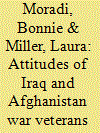

|
|
|
|
|
| Publication |
2010.
|
| Summary/Abstract |
U.S. policy banning openly gay and lesbian personnel from serving in its military rests on the belief that heterosexual discomfort with lesbian and gay service members in an integrated environment would degrade unit cohesion and readiness. To inform this policy, data from a 2006 survey of Iraq and Afghanistan war veterans are analyzed in this study. Views of these war veterans are consistent with prior surveys of military personnel showing declining support for the policy: from about 75 percent in 1993 to 40 percent in this survey. Among the demographic and military experience variables analyzed, comfort level with lesbian and gay people was the strongest correlate of attitudes toward the ban. War veterans indicated that the strongest argument against the ban is that sexual orientation is unrelated to job performance and that the strongest argument in favor of the ban is a projected negative impact on unit cohesion. However, analyses of these war veterans' ratings of unit cohesion and readiness revealed that knowing a gay or lesbian unit member is not uniquely associated with cohesion or readiness; instead, the quality of leaders, the quality of equipment, and the quality of training are the critical factors associated with unit cohesion and readiness.
|
|
|
|
|
|
|
|
|
|
|
|
|
|
|
|
| 2 |
ID:
094813
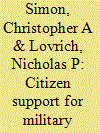

|
|
|
|
|
| Publication |
2010.
|
| Summary/Abstract |
Previous research on public opinion regarding military expenditures in the United States was conducted predominantly in the cold war context. This analysis of public opinion in thirty major U.S. cities over the period 1999 through 2002 revisits this earlier literature in light of changing sociopolitical conditions during a period bracketing the onset of the war on terrorism. The study offers support for much of the earlier research with respect to sources of support for robust military expenditures, in the process illustrating the value of archival data in replicating key research findings in extant literature conducted in a cold war context. The results of the multivariate analysis offer important insights into the sources of public support for military expenditure in the post-9/11 setting.
|
|
|
|
|
|
|
|
|
|
|
|
|
|
|
|
| 3 |
ID:
094814
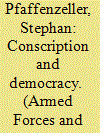

|
|
|
|
|
| Publication |
2010.
|
| Summary/Abstract |
The assumption of a mutually conditional relationship between democracy and conscription is a persistent aspect of the debate on civil-military relations. This article discusses the relationship between conscription and democracy, in a general sense and with reference to the German case. Following a review of conventional motives for conscription, it proceeds to discuss the relationship between conscription and democracy in terms of empirical coincidence and as a means of subjective military control. Continued assertion of an innate democracy-conscription nexus is found to be at variance with the evidence while retaining some influence over the ongoing debate on conscription. The conflation of democratic citizenship with conscription is linked to tensions with individual liberty and equality before the law.
|
|
|
|
|
|
|
|
|
|
|
|
|
|
|
|
| 4 |
ID:
094817


|
|
|
|
|
| Publication |
2010.
|
| Summary/Abstract |
Studies on active duty military families indicate that deployment disrupts normal functioning of the family. Scholars still, however, lack the necessary knowledge to fully grasp the impact that the current Iraq and Afghanistan wars have had on Army National Guard (ARNG) families who have experienced deployment. A grounded theoretical approach to interviews with ARNG spouses yields insight into how these families are coping with the often-unexpected event of wartime deployment. The authors identify stressors and coping strategies used by these spouses and offer suggestions for future research that will allow scholars to more fully understand the present situation ARNG families are facing.
|
|
|
|
|
|
|
|
|
|
|
|
|
|
|
|
| 5 |
ID:
094816
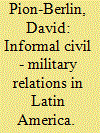

|
|
|
|
|
| Publication |
2010.
|
| Summary/Abstract |
This study examines the phenomenon of informal civil-military relations. Informal behaviors are those that normally do not occur within the chain of command, are not mandated by law, and do not conform to official procedures. Politicians and soldiers discover that formal, institutional routines are sometimes too constraining and that they can advance their interests more effectively by amending, circumventing, or violating those routines. The party most aggrieved by the rules of the game initiates an informal solution. Whether the other side goes along depends on how divergent its preferences are with the aggrieved party. Greatly divergent preferences result in unilateral informalities, less divergent but still negotiable positions yield bilateral-conflictive encounters, and convergent preferences result in cooperative ventures. Case studies on Chile, Argentina, and Bolivia exemplify three different kinds of informal encounters and their impacts on civilian policy choices and military interests.
|
|
|
|
|
|
|
|
|
|
|
|
|
|
|
|
| 6 |
ID:
094811
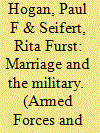

|
|
|
|
|
| Publication |
2010.
|
| Summary/Abstract |
Under the compensation system of the U.S. Armed Forces, members who are married or have dependents receive higher rates of pay and greater benefits than those who are single with no dependents. This article examines the hypothesis that these compensation policies induce earlier marriage by active-duty military members compared to otherwise similar civilians who have not served on active duty. Using a logistic regression model on American Community Survey data, the authors estimate the effect of active-duty military service on the probability of being married for twenty-three- to twenty-five-year-olds. Controlling for other factors affecting marriage rates, the authors find that the odds of being married were about three times greater for those with military service compared to similar civilians who have not served. For persons ever married, the probability of divorce is significantly greater for those who have served two or more years on active duty.
|
|
|
|
|
|
|
|
|
|
|
|
|
|
|
|
| 7 |
ID:
094815


|
|
|
|
|
| Publication |
2010.
|
| Summary/Abstract |
Although Israel constitutes an interesting case for the study of civil-military relations, the role played by its Directory of Military Intelligence (AMAN) has rarely been discussed in this context. This role is of special interest, since Israel is the only liberal democracy today in which a military intelligence service functions as the leading national estimator not only in military but also in civilian affairs. The unique Israeli model is usually justified by Israel's security concerns-primarily the threat of a sudden conventional attack. To test this model's validity, this article (1) traces and elucidates its historical development; (2) employs five crucial mini case studies to test its practical success or failure; and (3) explains how, in light of the fact that AMAN failed in four of the five cases, its military characteristics create inherent weaknesses that hamper its ability to serve as a high-quality national intelligence estimator.
|
|
|
|
|
|
|
|
|
|
|
|
|
|
|
|
| 8 |
ID:
094818


|
|
|
|
|
| Publication |
2010.
|
| Summary/Abstract |
The Defense Manpower Data Center of the U.S. Department of Defense launched the 2006 Survey of Active Duty Spouses to assess attitudes of the spouses of U.S. active-duty military members. Severe problems existed with the sampling, weight adjustments, and estimation (including variance-estimation) procedures. Stratification of the sample without proper consideration of the survey objectives made it impossible to achieve reportable information for many desired population subgroups. Excessive stratification caused many of the sampling strata to have very small numbers of respondents, both expected and actual. Consequently, nonresponse bias was probably enormous across many of the strata. Absurd weight adjustments likely contributed toward rendering many survey estimates unreliable. To make the survey estimates seem more precise, sampling strata were collapsed together to form new "variance strata" for variance estimation. Caution is advised in using results from this and other Defense Manpower Data Center surveys.
|
|
|
|
|
|
|
|
|
|
|
|
|
|
|
|
| 9 |
ID:
094812
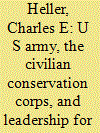

|
|
|
|
|
| Publication |
2010.
|
| Summary/Abstract |
Prior to World War II, the U.S. Army numbered 187,000 soldiers. Its growth to more than 8 million was a significant accomplishment. Little known to most, the Franklin D. Roosevelt administration's youth program, the Civilian Conservation Corps (CCC), provided the pretrained manpower to fill the U.S. Army's ranks upon mobilization with men who readily assumed the role of Non-Commissioned Officers (NCOs). It also gave Organized Reserve Corps officers the opportunity to occupy leadership positions, an experience that would have been unavailable otherwise. By the same token, it allowed the Regular Army to assess the leadership potential of both Regular and Reserve Officers in leading future citizen soldiers. Last, it provided the Army with an opportunity to exercise its mobilization plans.
|
|
|
|
|
|
|
|
|
|
|
|
|
|
|
|
|
|
|
|
|